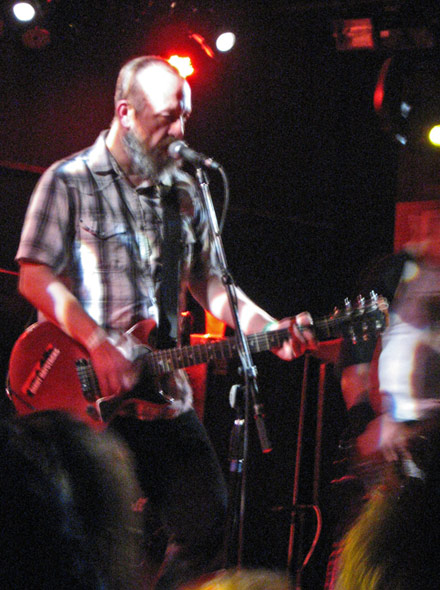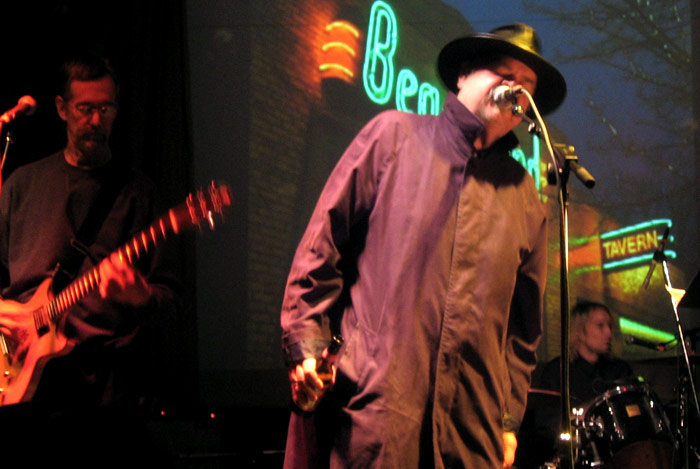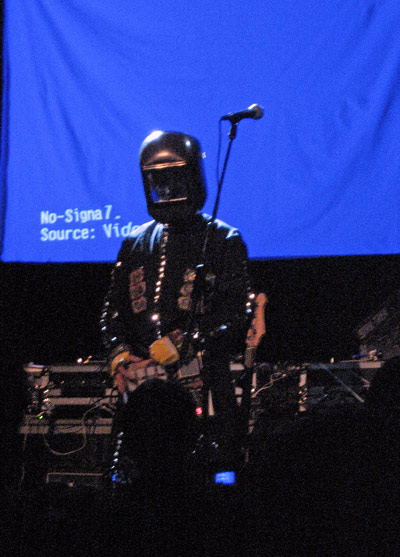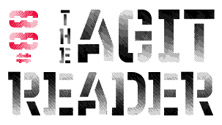
Knitting Factory, Brooklyn, March 5
by Stephen Slaybaugh
With a four-band bill, I had guesstimated (y’know like “I bet I can guesstimate your weight”) 11:30 to be a safe bet for arriving at the recently opened Williamsburg version of the Knitting Factory to catch the headliners, Sunderland, England’s best, Leatherface. I had figured wrong. Wedging into the soldout venue, I found the perennial punks were already a third of the way into their set and had already built up a sweat, while much of the crowd had done the same, with punters flinging themselves on and off the stage while being mindful of singer, guitarist and Leatherface founder Frankie Stubbs, who was leading the band through “Hoodlum” from 2004’s Dog Disco.
Stubbs’ himself is the embodiment of the voice that for more than 20 years has been a gristly antidote to the multitude of cliches prevalent in punk. Those vocals are what might be called an acquired taste, though what Leatherface does is fairly straightforward: fast and furious melodic punk in the vein of Stiff Little Fingers and the first few Damned singles. On songs like “Sour Grapes” (from Horsebox) and “Nutcase” and “Broken” (both from the band’s new album, The Stormy Petrel), Stubbs’ grizzled vocals were a raspy counterpoint to his and his backers’ frantic but tuneful playing. However grey his beard, though, the man was more than spry enough as he bound through plenty of new tracks and classics like “I Want the Moon,” which had the crowd joining in on the chorus, and “Pale Moonlight,” which closed out the initial set.
For the first encore, Leatherface pulled out “Not a Day Goes By” (from Mush), which may have been the highlight of the night. Some of the crowd had cleared out before the second encore, which consisted mostly of covers, namely “You Are My Sunshine” and the closing “Message in a Bottle,” which bested the original in too many ways to mention here. It’s a rare thing for Leatherface to make it to this side of the pond, and with an excellent new album in tow, this was a noteworthy night and one worth savoring.

Beachland Ballroom, Cleveland, March 5
by Pat Leonard
This special performance of Pere Ubu’s classic first full-length album, The Modern Dance, in its entirety was part of a weekend-long celebration of the Beachland’s 10th anniversary. And while much has changed since 1978, Pere Ubu, though never a band to wallow in nostalgia, was still able to resurrect the energy and brilliance of this seminal work in its current incarnation.
The band ambled onstage and began warming the crowd and themselves with the pulsating rhythm of “Final Solution.” Leader and singer David Thomas was dressed in a brown trench coat and black fedora. He had a music stand with lyric sheets by his side, and though his brows were knit through most of the set, one could catch him from time to time stealing glances for the next line. Some of the wail and flutter is gone from Thomas’ voice after 30 years, but his delivery and mannerisms are no less evocative. He quickly commanded the stage.
Thomas explained early in the set that he would not be beating on metal or concrete as in the days of yore, so it was up to Robert Wheeler and his bank of keyboards and synthesizers to fill in the gaps. He played samples of shattering glass during “Sentimental Journey” and twisted the knobs on several instruments to recreate Allen Ravenstine’s industrial noises that filled so many of the jams and breakdowns of those classic early Ubu tunes.
Drummer Steve Mehlman was precise and patient, often watching Wheeler for cues during the stretches when Thomas would wonder behind the backstage curtain to let the band fall apart and come back together again between verses. On the other hand, guitarist Tom Herman was unfazed, calmly cranking out note-for-note perfect solos from the original recording, most notably on “Humor Me.”
Known for being cantankerous, Thomas chided his bandmates and the soundman throughout the set, but one could tell that he was enjoying revisiting these old songs in the familiar confines of the Beachland, surrounded by an audience made up of many who no doubt haunted clubs like the Pirate’s Cove during the band’s green years. Thomas took the time to introduce a number of the tunes with bits of trivia, recalling that “Street Waves” was inspired by a tire shop on Detroit Road. Before playing “Chinese Radiation,” Thomas said that in the 1960s, the largest concentration of Maoists in the United States lived in Cleveland, and during the ’70s the Chinese conducted a series of nuclear tests, creating a cloud of radiation that passed over the North Pole and settled—you guessed it—right over Cleveland. To Thomas these facts provided the perfect “metaphor for love.”
The Modern Dance clocks in at a little more than 30 minutes, so Pere Ubu augmented their set with encores from the same era. They worked through all the early Hearthan singles: “30 Seconds Over Tokyo,” “Heart of Darkness,” and “My Dark Ages (I Don’t Get Around).” Before the band kicked off the gentile Caribbean rhythm of “Heaven,” Thomas sardonically noted, “If we had repeated this song 17 times, we could have been UB40.” Thomas had promised near the beginning of the band’s hour-long set that they would take the audience back to how it sounded at the Pirate’s Cove more than 30 years ago, and he largely delivered on that promise.

Music Hall of Williamsburg, Brooklyn, March 6
by Stephen Slaybaugh
Over the course of the dozen years of his career, RJD2 has done many things—from backing hip-hop MCs to moody cut-and-paste pastiches to organically made pop—and his live performances have been almost as diverse. I had seen him work as a DJ and also perform his original material on a bevy of decks, samplers and other equipment, but never with a band, as he had begun doing while promoting 2007’s The Third Hand.
For this show, the second in the third leg of a four-month tour, RJ brought a little bit of everything to the table. He came onstage in a welder’s helmet and jumpsuit, with a sampler strapped to his crotch. After demonstrating the abilities of his testicularly powered apparatus, he moved to his turntables—four of them in total—augmented by another sampler. His selection of material was equally eclectic, running from “Smoke & Mirrors” and “The Proxy” from his debut, Dead Ringer, crowd-pleaser “1976” from Since We Last Smoke, and “Let There Be Horns” from his latest, The Colossus.
But it was when the band took the stage that RJ revealed his mettle—whether still behind the decks or picking up a guitar or bass. For this tour, he’s selected a crew of top-notch players from his former home of Columbus, Ohio. Happy Chichester (Twilight Singers, Howlin’ Maggie, Royal Crescent Mob), who also opened the show, played (mostly) keyboards; Sam Brown (New Bomb Turks, The Sun, Gaunt, V3) was on drums; and Derek DiCenzo, a virtuoso whose credentials are as wide-ranging as playing on records by jazz guitarist Jim Hall and a 7-inch by the Thomas Jefferson Slave Apartments, was the artillery player, handling whatever keyboard or guitar needed to be played at any moment. When the band brought cuts like “The Horror” and “Since We Last Spoke” to life, RJ’s material transcended its recordings, perhaps finally sounding like he originally envisioned. (He once told me that he sampled records because he didn’t know how to get real instruments to sound the way they did on certain records.) Indeed, the night’s greatest triumph was a rendition of “Ghostwriter,” Chichester’s acoustic guitar melding with knockout beats.
Aaron Livingston joined the band for “Crumbs off the Table,” the track he sings on The Colossus, as well as “Games You Can Win” and “The Shining Path” from the same record. It was striking on these soulful songs how much RJ’s songwriting has matured from the simple pop of The Third Hand. For his encore, he wasn’t afraid to show his softer side with the “Making Days Longer,” fingerpicking delicate notes to accompany his modern day lovesong. Like everything he did this night, it was boldly different from what had just come before, showing he continues to always strive towards the next thing.
The Soundtrack of Our Lives Live Review
Walking on the Moon: The Untold Story of the Police and the Rise of New Wave Rock
Bowie: A Biography
Soul Power
Prefuse 73 Live Review
Best Music Writing 2009
Sid! By Those Who Really Knew Him
Bomp! 2: Born in the Garage
When Giants Walked the Earth: A Biography of Led Zeppelin
The Devil Went Home and Puked: Robert Pollard's Rock Show
Skinny Puppy and Surfer Blood Live Reviews
Light: On the South Side
Eccentric Soul Revue Live Review
The Stooges: The Authorized and Illustrated Story
